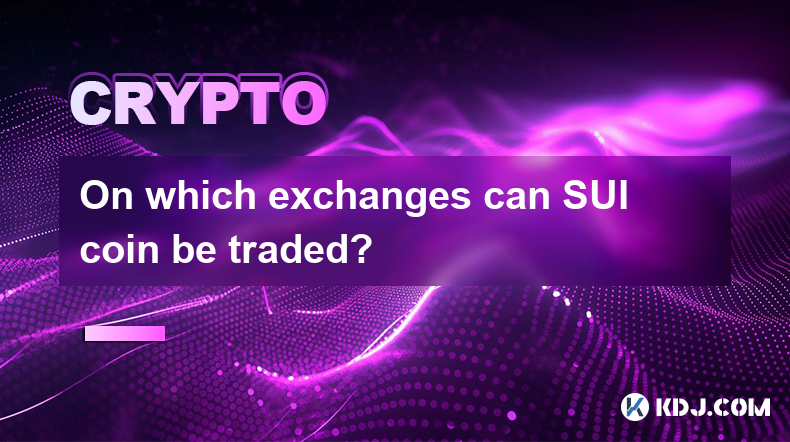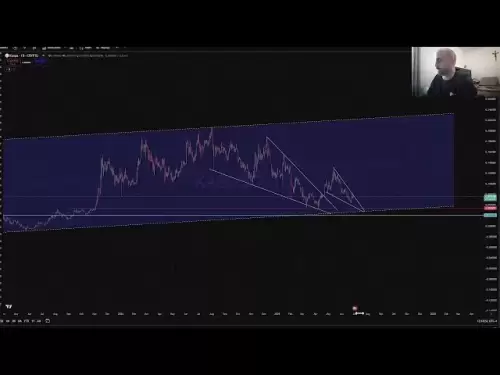-
 Bitcoin
Bitcoin $107,341.7259
0.15% -
 Ethereum
Ethereum $2,438.6204
0.70% -
 Tether USDt
Tether USDt $1.0003
-0.02% -
 XRP
XRP $2.1866
1.94% -
 BNB
BNB $649.0952
0.36% -
 Solana
Solana $150.9602
5.63% -
 USDC
USDC $0.9999
0.00% -
 TRON
TRON $0.2742
0.40% -
 Dogecoin
Dogecoin $0.1645
1.93% -
 Cardano
Cardano $0.5669
1.18% -
 Hyperliquid
Hyperliquid $37.8286
4.19% -
 Bitcoin Cash
Bitcoin Cash $491.4669
-2.74% -
 Sui
Sui $2.8150
3.06% -
 Chainlink
Chainlink $13.4184
2.91% -
 UNUS SED LEO
UNUS SED LEO $9.0809
0.27% -
 Avalanche
Avalanche $18.0295
2.60% -
 Stellar
Stellar $0.2396
1.19% -
 Toncoin
Toncoin $2.8587
0.13% -
 Shiba Inu
Shiba Inu $0.0...01160
2.59% -
 Litecoin
Litecoin $86.4192
1.45% -
 Hedera
Hedera $0.1486
1.19% -
 Monero
Monero $308.4324
0.87% -
 Polkadot
Polkadot $3.4202
1.43% -
 Bitget Token
Bitget Token $4.6436
-0.34% -
 Dai
Dai $0.9998
-0.02% -
 Ethena USDe
Ethena USDe $1.0002
0.00% -
 Uniswap
Uniswap $7.1527
3.29% -
 Pi
Pi $0.5357
-8.45% -
 Pepe
Pepe $0.0...09588
4.61% -
 Aave
Aave $259.9759
0.81%
On which exchanges can SUI coin be traded?
Sui (SUI) trades on major CEXs like Binance & KuCoin, offering high liquidity, but DEXs provide peer-to-peer trading with potentially lower liquidity and higher fees. Exchange listings change frequently, so check announcements; prioritize security when choosing a platform.
Mar 11, 2025 at 03:25 pm

Key Points:
- SUI's availability varies across exchanges due to listing policies and regulatory considerations.
- Major centralized exchanges (CEXs) are the most common place to trade SUI, offering high liquidity.
- Decentralized exchanges (DEXs) provide peer-to-peer trading with potentially higher fees and lower liquidity.
- New listings are frequent, so checking exchange announcements is crucial.
- Security practices should always be prioritized when selecting an exchange and trading SUI.
On Which Exchanges Can SUI Coin Be Traded?
The Sui (SUI) cryptocurrency, a relatively new entrant to the market, is gaining traction. However, its availability on cryptocurrency exchanges is constantly evolving. Understanding where you can trade SUI depends on several factors, including the exchange's listing policies, regional regulations, and the overall demand for the coin.
Many major centralized exchanges (CEXs) have listed SUI. These include large platforms like Binance, OKX, KuCoin, and Huobi Global. These exchanges generally provide high liquidity, meaning you can usually buy or sell SUI relatively easily without significantly impacting the price. However, remember that using CEXs means entrusting your funds to a third party.
Trading on decentralized exchanges (DEXs) offers a different experience. DEXs like Uniswap and others that integrate with the Sui network allow for peer-to-peer trading, removing the need for a centralized intermediary. The advantage is increased privacy and control over your funds. However, DEXs often have lower liquidity than CEXs, potentially leading to higher transaction fees and slippage (the difference between the expected price and the actual execution price).
The list of exchanges supporting SUI is dynamic. New exchanges regularly add SUI to their offerings, while others might delist it based on various factors. It’s therefore essential to check the official announcements of exchanges you are interested in using. Regularly visiting the websites of major exchanges and checking their listed coins is a proactive way to stay updated.
Security should always be a top priority when choosing an exchange. Prior to depositing any funds, research the exchange's security measures, reputation, and history. Look for exchanges with robust security protocols, including two-factor authentication (2FA), cold storage for a significant portion of their assets, and a proven track record of security. Avoid using exchanges with questionable reputations or those lacking transparent security practices.
Furthermore, the availability of SUI can also be influenced by regional regulations. Some jurisdictions have stricter rules regarding cryptocurrency trading, potentially restricting access to certain exchanges or coins. It's crucial to be aware of the legal framework in your location before engaging in SUI trading. Understanding the specific regulations in your region is critical to ensure compliance.
Consider the fees associated with trading on different exchanges. Fees can vary significantly depending on the exchange, the trading pair (e.g., SUI/USDT, SUI/BTC), and the trading volume. Some exchanges might charge higher trading fees, while others might have lower fees but higher withdrawal fees. Comparing fees across different platforms is a prudent step before committing to a particular exchange.
Beyond the well-known exchanges, several smaller or more niche platforms may also list SUI. These exchanges might offer unique features or cater to specific communities, but they might also have lower liquidity and potentially higher risks. Always research thoroughly before using any lesser-known exchange. Due diligence is essential for minimizing potential risks.
The process of buying SUI on an exchange typically involves creating an account, verifying your identity (KYC – Know Your Customer), depositing funds (usually fiat currency or another cryptocurrency), and then placing an order to buy SUI. The specific steps might vary slightly from one exchange to another. Familiarize yourself with the specific procedures of your chosen exchange before initiating any transactions.
Frequently Asked Questions:
Q: Is it safe to trade SUI on smaller, less-known exchanges?
A: Trading on smaller exchanges carries higher risks due to potential vulnerabilities in security, lower liquidity, and a less established reputation. It's crucial to conduct thorough research before using any unfamiliar exchange.
Q: How can I stay updated on which exchanges list SUI?
A: Regularly check the announcements sections of major cryptocurrency exchanges and follow SUI's official social media channels and website for updates.
Q: What are the typical fees involved in trading SUI?
A: Fees vary depending on the exchange, trading pair, and trading volume. Check the fee schedule of your chosen exchange for details.
Q: What is the difference between trading SUI on a CEX and a DEX?
A: CEXs offer higher liquidity and convenience but require entrusting your funds to a third party. DEXs offer more privacy and control but might have lower liquidity and higher fees.
Q: Are there any legal restrictions on trading SUI?
A: Legal restrictions on cryptocurrency trading vary by jurisdiction. It's crucial to understand the regulations in your location before trading SUI.
Disclaimer:info@kdj.com
The information provided is not trading advice. kdj.com does not assume any responsibility for any investments made based on the information provided in this article. Cryptocurrencies are highly volatile and it is highly recommended that you invest with caution after thorough research!
If you believe that the content used on this website infringes your copyright, please contact us immediately (info@kdj.com) and we will delete it promptly.
- Trump, Bitcoin, and Peter Schiff: A New York Minute on Crypto Chaos
- 2025-06-29 12:30:12
- BTC Price, BlackRock ETF, Fed Signals: Decoding the Crypto Crossroads
- 2025-06-29 12:30:12
- SEI Price Skyrockets Amid ETF Hype and Bullish Uptrend: What's Next?
- 2025-06-29 12:50:11
- Bitcoin Mining, Cryptocurrency, and Blockchain: A New York State of Mind
- 2025-06-29 13:10:11
- Dogecoin's Double Bottom: Is an Explosive Move Imminent?
- 2025-06-29 12:55:11
- Kitten Craze Online: Hunting for the Purr-fect Coin Purse
- 2025-06-29 10:30:12
Related knowledge

How to customize USDT TRC20 mining fees? Flexible adjustment tutorial
Jun 13,2025 at 01:42am
Understanding USDT TRC20 Mining FeesMining fees on the TRON (TRC20) network are essential for processing transactions. Unlike Bitcoin or Ethereum, where miners directly validate transactions, TRON uses a delegated proof-of-stake (DPoS) mechanism. However, users still need to pay bandwidth and energy fees, which are collectively referred to as 'mining fe...

USDT TRC20 transaction is stuck? Solution summary
Jun 14,2025 at 11:15pm
Understanding USDT TRC20 TransactionsWhen users mention that a USDT TRC20 transaction is stuck, they typically refer to a situation where the transfer of Tether (USDT) on the TRON blockchain has not been confirmed for an extended period. This issue may arise due to various reasons such as network congestion, insufficient transaction fees, or wallet-rela...

How to cancel USDT TRC20 unconfirmed transactions? Operation guide
Jun 13,2025 at 11:01pm
Understanding USDT TRC20 Unconfirmed TransactionsWhen dealing with USDT TRC20 transactions, it’s crucial to understand what an unconfirmed transaction means. An unconfirmed transaction is one that has been broadcasted to the blockchain network but hasn’t yet been included in a block. This typically occurs due to low transaction fees or network congestio...

How to check USDT TRC20 balance? Introduction to multiple query methods
Jun 21,2025 at 02:42am
Understanding USDT TRC20 and Its ImportanceUSDT (Tether) is one of the most widely used stablecoins in the cryptocurrency market. It exists on multiple blockchain networks, including TRC20, which operates on the Tron (TRX) network. Checking your USDT TRC20 balance accurately is crucial for users who hold or transact with this asset. Whether you're sendi...

What to do if USDT TRC20 transfers are congested? Speed up trading skills
Jun 13,2025 at 09:56am
Understanding USDT TRC20 Transfer CongestionWhen transferring USDT TRC20, users may occasionally experience delays or congestion. This typically occurs due to network overload on the TRON blockchain, which hosts the TRC20 version of Tether. Unlike the ERC20 variant (which runs on Ethereum), TRC20 transactions are generally faster and cheaper, but during...

The relationship between USDT TRC20 and TRON chain: technical background analysis
Jun 12,2025 at 01:28pm
What is USDT TRC20?USDT TRC20 refers to the Tether (USDT) token issued on the TRON blockchain using the TRC-20 standard. Unlike the more commonly known ERC-20 version of USDT (which runs on Ethereum), the TRC-20 variant leverages the TRON network's infrastructure for faster and cheaper transactions. The emergence of this version came as part of Tether’s...

How to customize USDT TRC20 mining fees? Flexible adjustment tutorial
Jun 13,2025 at 01:42am
Understanding USDT TRC20 Mining FeesMining fees on the TRON (TRC20) network are essential for processing transactions. Unlike Bitcoin or Ethereum, where miners directly validate transactions, TRON uses a delegated proof-of-stake (DPoS) mechanism. However, users still need to pay bandwidth and energy fees, which are collectively referred to as 'mining fe...

USDT TRC20 transaction is stuck? Solution summary
Jun 14,2025 at 11:15pm
Understanding USDT TRC20 TransactionsWhen users mention that a USDT TRC20 transaction is stuck, they typically refer to a situation where the transfer of Tether (USDT) on the TRON blockchain has not been confirmed for an extended period. This issue may arise due to various reasons such as network congestion, insufficient transaction fees, or wallet-rela...

How to cancel USDT TRC20 unconfirmed transactions? Operation guide
Jun 13,2025 at 11:01pm
Understanding USDT TRC20 Unconfirmed TransactionsWhen dealing with USDT TRC20 transactions, it’s crucial to understand what an unconfirmed transaction means. An unconfirmed transaction is one that has been broadcasted to the blockchain network but hasn’t yet been included in a block. This typically occurs due to low transaction fees or network congestio...

How to check USDT TRC20 balance? Introduction to multiple query methods
Jun 21,2025 at 02:42am
Understanding USDT TRC20 and Its ImportanceUSDT (Tether) is one of the most widely used stablecoins in the cryptocurrency market. It exists on multiple blockchain networks, including TRC20, which operates on the Tron (TRX) network. Checking your USDT TRC20 balance accurately is crucial for users who hold or transact with this asset. Whether you're sendi...

What to do if USDT TRC20 transfers are congested? Speed up trading skills
Jun 13,2025 at 09:56am
Understanding USDT TRC20 Transfer CongestionWhen transferring USDT TRC20, users may occasionally experience delays or congestion. This typically occurs due to network overload on the TRON blockchain, which hosts the TRC20 version of Tether. Unlike the ERC20 variant (which runs on Ethereum), TRC20 transactions are generally faster and cheaper, but during...

The relationship between USDT TRC20 and TRON chain: technical background analysis
Jun 12,2025 at 01:28pm
What is USDT TRC20?USDT TRC20 refers to the Tether (USDT) token issued on the TRON blockchain using the TRC-20 standard. Unlike the more commonly known ERC-20 version of USDT (which runs on Ethereum), the TRC-20 variant leverages the TRON network's infrastructure for faster and cheaper transactions. The emergence of this version came as part of Tether’s...
See all articles

























































































